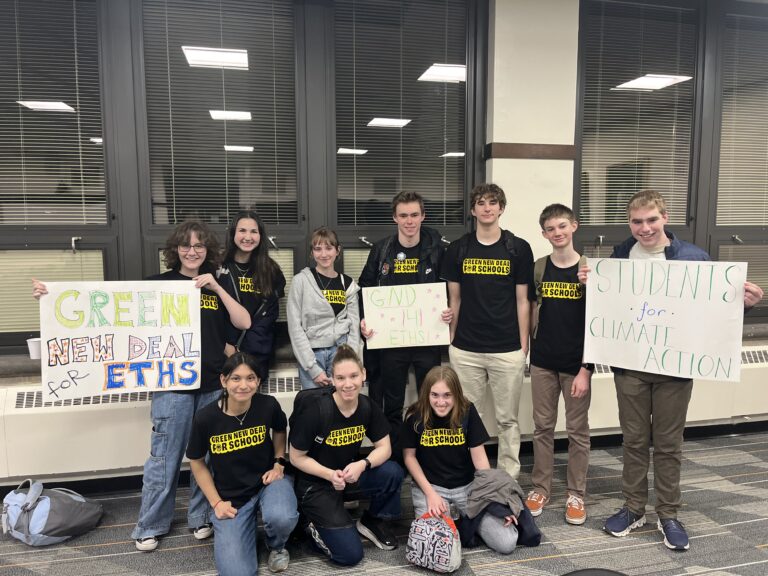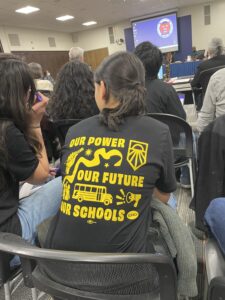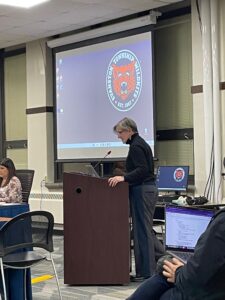
Around Chicagoland, students are taking the fight for a greener future to a familiar territory close to home: schools. Student-led advocacy in several Chicago suburbs has led to school districts adopting ambitious sustainability policies, and this is a trend that’s growing both locally and nationally.
Seven Generations Ahead (SGA) has deep expertise working with schools across multiple facets of sustainability. From instituting composting and waste reduction programs, to integrating renewable energy, to sourcing locally and sustainably grown food for cafeterias, SGA has led impactful sustainability initiatives in numerous schools across the Chicago area and beyond and is well-positioned to support the growth of this trend.
Engaging youth in school sustainability initiatives and equipping them with the knowledge and skills to advocate in their schools and communities is core to SGA’s sustainability work in the education sector. In the fall of 2021, a group of students who participated in SGA’s youth climate advocacy program, It’s Our Future (IOF), attended the UN Climate Conference in Glasgow (COP26). Energized and inspired after talking about the climate crisis on the global stage, several of these students from Oak Park River Forest High School (OPRF) decided to get involved in advocating for District 200 to adopt a sustainability policy. IOF students Manolo Avalos, Sophie Ball, Jelena Collins, and Charlotte Meyer were among the team at OPRF who engaged in talks with the superintendent of D200 about adopting a formal sustainability policy. SGA team members lent their expertise to the development of the policy, as well, providing guidance on pathways for OPRF to reduce its greenhouse gas emmissions.
After significant efforts by the student advocates, school administration, and school board members, OPRF’s sustainability policy was passed in 2022. As a testament to the impact this policy is already having, in January 2024 the D200 Board of Education approved the installation of a new geothermal heating and cooling system that is projected to reduce the school’s carbon dioxide emissions by over 400,000 pounds per year, as compared to a natural gas system. Additionally, Oak Park’s elementary school district, D97, has now also adopted a sustainability policy, following in D200’s path.
While the greenhouse gas emissions reductions are important, Manolo Avalos says the students were also adamant that climate education be incorporated into the high school curriculum across all subjects. Right now they’re focusing on English, and Avalos says there’s a group of students at OPRF working with a teacher on what climate in an English curriculum would look like. Avalos says now that the broader policy is passed, it’s the details that need to be worked out. “I think most of the big work is done,” he says. “Now it’s the tiny pieces.”
One of those pieces, which isn’t so tiny, is the sustainability “scorecard.” The OPRF Environmental club, which also includes IOF students Kate Wallace and Katie Stabb, is in charge of the scorecard, which grades administrators based on how well they respond to and support the sustainability policy. It’s a student-driven mechanism for holding the adults accountable for the work they’ve committed to.
 The impact of OPRF’s sustainability policy is being felt well beyond the boundaries of the school district. Evanston Township High School just adopted their own sustainability policy on February 26th, 2024, and there’s a direct link to OPRF’s policy: IOF student advocacy. IOF students at ETHS were able to point to the work done by SGA and OPRF students to develop the OPRF policy, which ultimately served as an important blueprint for ETHS. The story of the policy, known now as the Green New Deal (GND) for ETHS, started back in 2019 when a Sustainability Committee at ETHS and E-Town Sunrise were first formed. Although these entities supported the creation of a policy, the idea did not start gaining momentum until 2021, when former IOF student, former hub coordinator for E-Town Sunrise, and recent ETHS graduate Miah Ebels-Duggan organized with other students for District 202 to hire someone in a sustainability role. The district listened, and in 2022 hired John Crawford as Director of Operations and Sustainability. From there, students began organizing for a comprehensive sustainability policy. They engaged with staff, teachers, administrators and local experts to help draft the policy, which took about a year.
The impact of OPRF’s sustainability policy is being felt well beyond the boundaries of the school district. Evanston Township High School just adopted their own sustainability policy on February 26th, 2024, and there’s a direct link to OPRF’s policy: IOF student advocacy. IOF students at ETHS were able to point to the work done by SGA and OPRF students to develop the OPRF policy, which ultimately served as an important blueprint for ETHS. The story of the policy, known now as the Green New Deal (GND) for ETHS, started back in 2019 when a Sustainability Committee at ETHS and E-Town Sunrise were first formed. Although these entities supported the creation of a policy, the idea did not start gaining momentum until 2021, when former IOF student, former hub coordinator for E-Town Sunrise, and recent ETHS graduate Miah Ebels-Duggan organized with other students for District 202 to hire someone in a sustainability role. The district listened, and in 2022 hired John Crawford as Director of Operations and Sustainability. From there, students began organizing for a comprehensive sustainability policy. They engaged with staff, teachers, administrators and local experts to help draft the policy, which took about a year.
“The collaboration of all these people was indispensable to the writing process and hopefully the future success of the policy,” says Ebels-Duggan. “Engaging with all these categories of stakeholders, from within the school and without, made sure that we had a wealth of knowledge, interests, and perspectives on board.”
Concurrent with the sustainability policy work, IOF student Lily Aaron and others formed a Climate Curriculum Committee. It’s clear that climate education is a key priority at both OPRF and ETHS, as it’s folded into both school’s sustainability policies.
“From the first day of Kindergarten to high school graduation, students simply must be equipped with the tools to face the climate crisis,” says Milo Slevin, a current ETHS student who has also been actively involved in the policy process and is a member of E-Town Sunrise.
Slevin also says, accountability was a major priority for students at ETHS, again echoing the student demands at OPRF. The GND for ETHS includes eight goal areas, which students plan to get started on right away.
“We will form student-driven subcommittees, connecting activists with experts to brainstorm ways for our school to reach these goals,” says Slevin. “Since we are jumping right into the execution, we prevent school administrators from kicking the can down the road or delaying their action.”
It’s clear D200, D97, and D202 are on the leading edge of a nationwide trend. The passage of the GND for ETHS makes D202 the third school district in the nation, following districts in Boulder, Colorado and Washington, D.C., to adopt a Green New Deal. Earlier in February, Sunrise Chicago and representatives from Chicago Public Schools held a rally to officially mark the launch of the Green New Deal for CPS campaign.

IOF Program Manager, Rachel Rosner, speaking at a D202 board meeting in support of the GND for ETHS.
Seven Generations Ahead and It’s Our Future expect that the roadmaps developed in Oak Park and Evasnton will continue to provide blueprints for schools around Chicagoland.
Natasha Bhatia, an IOF student at Hinsdale Central High School who attended COP28 last year, says students in their Ecology Club, and others who have joined IOF are working on a variety of sustainability initiatives at the school, including increasing recycling and decreasing single-use plastics. But the cornerstone of their effort, currently, is climate education.
“Since COP28, I’ve met with my school Assistant Principal of Operations, my Assistant Principal for Instruction, and my previous Honors Biology teacher about incorporating Climate Education in classes at Central,” says Bhatia. “We are starting the process of standardizing a climate curriculum at Central in Science and Social Studies classes, with the end aim of incorporating it throughout classes at the district level.” The ultimate goal is a comprehensive, district wide sustainability policy.
IOF student Danica Sun and other students at the Illinois Math and Science Academy have met with the school’s president and facilities director about sustainability. They’ve been asked to review the school’s policies and make recommendations to the administration.
Finally, SGA sees a tremendous opportunity to use the sustainability policy success stories at OPRF and ETHS as a roadmap for schools in the communities that participate in the Cross Community Climate Collaborative (C4). Through C4’s K-12 sector meetings, schools can share best practices in sustainability, meaning they don’t have to reinvent the wheel when it comes to waste reduction, renewable energy, and climate education. These meetings serve as an important tool for SGA to continue to scale sustainability policies and initiatives in the education sector. For example, IOF student Maia Nelson attends Riverside-Brookfield High School, part of the C4 communities. She and other students are working with teachers and administrators to adopt composting in the school cafeteria and institute a “no idling zone” in front of the school to help reduce emissions from transportation. They’re not yet in talks about a district-wide sustainability policy, but Nelson says she’d like to push towards one, and she believes there would be wide support from students.
It’s clear students across Chicagoland and across the country are eager for more ambitious climate action in their schools. OPRF and ETHS are on the leading edge of the push for comprehensive district-wide sustainability policies, and the advocacy for these policies is strongly student driven. SGA’s programs like It’s Our Future and C4 can provide pathways by which these policies can spread, increasing their already profound impact, and serving as an important tool in the climate fight.
